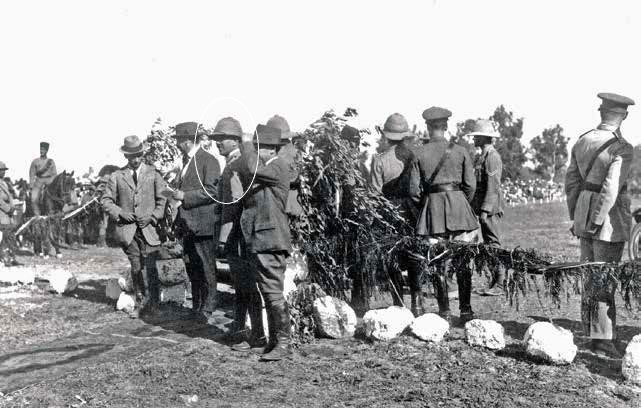It left 95 people dead and 219 injured. But the death toll would have been much higher if it had not been for the efforts of a soldier from Jersey – Major Lionel Mansell Jeune.
And now the British Embassy in Israel is trying to track down his friends and family.
Major Jeune is credited with courageously saving at least 100 Jews and an unknown number of Arabs during the notorious Jaffa Riots.
Chaim Weizman, who later became the first Israeli president, wrote Major Jeune a letter thanking him and vowing that the Jewish people would never forget his courageous conduct.
A ceremony to honour him was held at Jaffa Port on Sunday.
Major Jeune was based in Palestine at the time of the riots, which took place between 1 and 7 May 1921.
Palestine had been part of the Ottoman Empire, which was allied with the Germans in the First World War. After the war the empire was broken up and Britain took charge of Palestine.
Britain had promised the Arabs who lived there that it would help them to set up their own government. But it had also promised the territory to the Jews as a homeland and, shortly after the war, Jewish settlers started to arrive.
The riots started as a fight between two different Jewish groups, both of whom held rallies in Jaffa.
The British police tried to break up the fight and local Arabs, believing that other Arabs were being attacked, retaliated.

The rioting spread to other areas and, by the end of the week, 47 Jews had been killed and a further 146 injured. Forty-eight Arabs had lost their lives, with 73 injured.
The police found themselves unable to cope with the large mob of Arab insurgents. But Major Jeune risked his own life to help.
He rescued Jewish merchants at the market and others who were being hidden from the mob by their Arab neighbours.
He then arrived at Beit Hachalutz, the hostel for new Jewish immigrants, just as rioters started to break down the doors of the rooms where Jews were sheltering. He fired a single shot from his revolver and the mob scattered.
Soon after he received a message that a mob was trying to break into the nearby hospital where the injured had been transported, and he managed to drive the rioters away.
Major Jeune also spoke of Arabs he had rescued when Jews tried to lynch them in revenge, according to the British Embassy in Israel.
Some details of the Major’s life in Jersey have been uncovered. He was the youngest of three children born in St Martin to George Manzella Jeune, an assistant schoolteacher, and Elizabeth Handsyde Popplewell.
On 27 January 1903 he married Ada Gordon Dryden, from Morpeth in Northumberland, in St Helier and the following year they had their only child, Frank.
Ada died in 1910 and was buried in St Martin.
On their marriage certificate, Major Jeune gave
his occupation as sailor. His address was recorded as 1 Almorah Villas, St Helier.
He went to work as a pilot in the Suez Canal and, in 1912, he married an Egyptian, Eftychia N Roidis in Port Said, Egypt. In 1915 he joined the Royal Engineers as a temporary Captain and then as a Major.
An account he wrote about the early days of the First World War describes how he was involved in preventing a German ship from blocking the Suez Canal.
Major Jeune remained in Tel Aviv following his duty in Jaffa and served in the army’s Intelligence Corps in Egypt during the Second World War. He died in Egypt at the age of 63 on 1 July 1943 and is buried in the Heliopolis War Cemetery in Cairo.
The cause of his death is unknown and the gravestone makes no mention of his military record.
The search for Lionel Jeune’s relations is being highlighted by States Deputy Inna Gardiner, who is Israeli.
She said: ‘Jeune is a Jersey name – we do have families here with that name.
‘I am waiting to hear from one individual called Jeune because there might be some connection although we don’t know yet.
‘I hope we will find some family connections in Jersey.’
Any friends or relations of Major Jeune can email Deputy Gardiner at I.Gardiner@gov.je.






